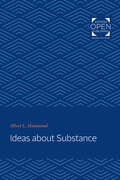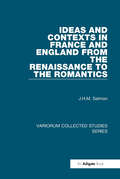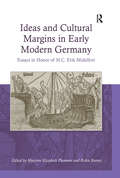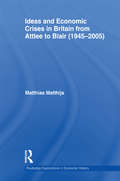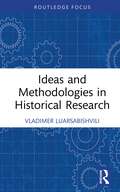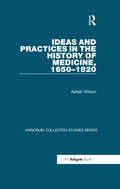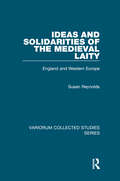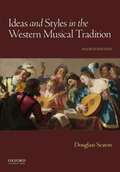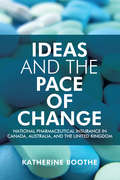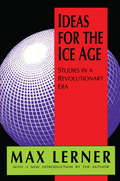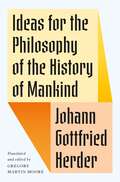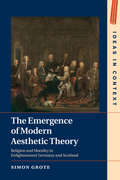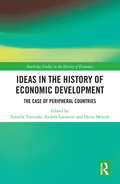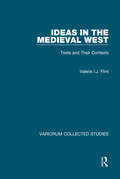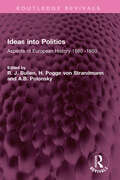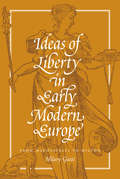- Table View
- List View
Ideas That Shaped Buildings
by Fil HearnIn Ideas That Shaped Buildings, Fil Hearn identifies and codifies into theoretical systems the operative tenets of architectural theory from ancient Rome to the present.
Ideas Triumphant: Strategies for Social Change and Progress
by Lawrence LaderThe intellectual spark that set off the flames of revolution in France and the United States was the same one that prompted a change in the way women viewed themselves and their role in society. Initially, the struggle for equal rights was meant to apply only to men but the strength of an ideal took hold and a movement was born. "Ideas Triumphant" is the history of the reproductive rights movement from its early roots in post-revolutionary France to the enormous strides made by reproductive rights activists in the twentieth century. As women began to take control of their reproductive choices they were able to make greater contributions to the world of finance, academics, and sciences. No longer beaten down and burdened with countless pregnancies and the accompanying high risk of death during childbirth, these women were able to contribute more to society and slowly dispel the myth of female inferiority. "Ideas Triumphant" follows a path of an enlightened thought from its revolutionary beginning to its current place in its continuing evolution. It looks at the important people and the events that lead to the success of an idea and the transformation of a culture.
Ideas about Substance (Seminar in the History of Ideas)
by Albert L. HammondOriginally published in 1969. Ideas about Substance is a part of the "Seminars in the History of Ideas" series at Johns Hopkins University Press.
Ideas and Contexts in France and England from the Renaissance to the Romantics (Variorum Collected Studies)
by J.H.M. SalmonThese essays examine the thought and works of a series of writers on political thought, religion, historiography and literature, from the 16th century to the 19th. Throughout, the author is concerned to situate individual thinkers in the context of their times and, in many of the essays, to illuminate the links between intellectual currents in France and England. Particular topics include Gallicanism, Neostoicism, the historical novel, and constitutionalism, while the figures dealt with range from Bodin and Hotman in the Renaissance, to Descartes and La Rochefoucauld in the Grand Siècle and Condorcet and Diderot in the Enlightenment. Less familiar figures include the Oxford historian, Degory Wheare, and the French constitutional theorist, Henrion de Pansey. Among the topics treated in the Romantic era are comparisons between the French and English revolutions, and the French obsession with Oliver Cromwell.
Ideas and Cultural Margins in Early Modern Germany: Essays in Honor of H.C. Erik Midelfort
by Marjorie Elizabeth Plummer Robin B. BarnesWhile the assumption of a sharp distinction between learned culture and lay society has been broadly challenged over the past three decades, the question of how ideas moved and were received and transformed by diverse individuals and groups stands as a continuing challenge to social and intellectual historians, especially with the emergence and integration of the methodologies of cultural history. This collection of essays, influenced by the scholarship of H.C. Erik Midelfort, explores the new methodologies of cultural transmission in the context of early modern Germany. Bringing together articles by European and North American scholars: this volume presents studies ranging from analyses of individual worldviews and actions, influenced by classical and contemporary intellectual history, to examinations of how ideas of the Reformation and Scientific Revolution found their way into the everyday lives of Germans of all classes. Other essays examine the ways in which individual thinkers appropriated classical, medieval, and contemporary ideas of service in new contexts, discuss the means by which groups delineated social, intellectual, and religious boundaries, explore efforts to control the circulation of information, and investigate the ways in which shifting or conflicting ideas and perceptions were played out in the daily lives of persons, families, and communities. By examining the ways in which people expected ideas to influence others and the unexpected ways the ideas really spread, the volume as a whole adds significant features to our conceptual map of life in early modern Europe.
Ideas and Economic Crises in Britain from Attlee to Blair (Routledge Explorations in Economic History #50)
by Matthias M MatthijsDuring the period from 1945 to 2005, Britain underwent two deep-seated institutional transformations when political elites successfully challenged the prevailing wisdom on how to govern the economy. Attlee and Thatcher were able to effectively implement most of their political platforms. During this period there were also two opportunities to challenge existing institutional arrangements. Heath's 'U-turn' in 1972 signalled his failure to implement the radical agenda promised upon election in 1970, whilst Tony Blair’s New Labour similarly failed to instigate a major break with the 'Thatcherite' settlement. Rather than simply retell the story of British economic policymaking since World War II, this book offers a theoretically informed version of events, which draws upon the literatures on institutional path dependence, economic constructivism and political economy to explain this puzzle. It will be of great interest to both researchers and postgraduates with an interest in British economic history and the fields of political economy and economic crisis more widely.
Ideas and Methodologies in Historical Research (Routledge Approaches to History)
by Vladimer LuarsabishviliThis book explores the versatile nature of historical methodology and its use in interdisciplinary research. Based on the historical overview of the appearance of one sort of historical ideas and disappearance of another, the book aims to demonstrate a wide range of possibilities of research in the field and to show how the pursuit of historical truth may facilitate the formation of collective memory and how the application of research tools can explain events in the contemporary world.
Ideas and Practices in the History of Medicine, 1650–1820 (Variorum Collected Studies #1038)
by Adrian WilsonAlthough articles in this volume fall into three thematic clusters, each of those groups exemplifies three general themes: micro-social processes; innovations and the question of continuity versus discontinuity; and the relationship between ideas and practice. Most of these essays touch upon, and some of them are exclusively concerned with, small scale social processes: e.g. the routines of the all-female early-modern childbirth ritual, the different ways that male practitioners were summoned to such occasions, the functioning of voluntary hospitals, the protocols underlying patient records. Such social practices are well worth studying as both the sites and drivers of larger-scale historical change. Whenever there comes into being something new - whether an institution (a hospital), a social practice (the summoning of men as midwives) or a concept (a new approach to disease) - the question arises as to its relationship with what went before. This concept resonates throughout these essays, but is most to the fore in the chapters on early Hanoverian London (which asks explanatory questions) and on Porter versus Foucault (who represent the extremes of continuity and discontinuity respectively). A couple of generations ago, the ’history of ideas’ was pursued largely without reference to practice; in recent times, the danger has appeared of the very reverse taking place. This book ranges across a broad spectrum in this respect, the emphasis being sometimes upon practice (Eleanor Willughby’s work as a midwife) and sometimes upon ideas (concepts of pleurisy across the centuries); but in every case there is at least the potential for relating the two to one another. None of these themes is specific to medical history; on the contrary, they are the bread-and-butter of historical reconstruction in general.
Ideas and Solidarities of the Medieval Laity: England and Western Europe (Variorum Collected Studies)
by Susan ReynoldsThis book contains essays written over the past 25 years about medieval urban communities and about the loyalties and beliefs of medieval lay people in general. Most writing about medieval religious, political, legal, and social ideas starts from treatises written by academics and assumes that ideas trickled down from the clergy to the laity. Susan Reynolds, whether writing about the struggles for liberty of small English towns, the national solidarities of the Anglo-Saxons, or the capacity of medieval peasants to formulate their own attitudes to religion, rejects this assumption. She suggests that the medieval laity had ideas of their own that deserve to be taken seriously.
Ideas and Styles in the Western Musical Tradition
by Douglass SeatonIdeas and Styles in the Western Musical Tradition, Fourth Edition, explores the conceptual frameworks that have shaped musical development from antiquity to the present. In a lively narrative that prompts readers to think both critically and creatively, Douglass Seaton uses historical documents from thinkers, artists, and musicians to add rich detail to the compelling story of Western music. This brief and accessible narrative of music history features numerous works of art, literature, and music that immerse students in the historical and intellectual contexts of musical styles.
Ideas and the Pace of Change
by Katherine BootheCanada is the only OECD country that has universal, comprehensive public hospital and medical insurance but lacks equivalent pharmaceutical coverage. In Ideas and the Pace of Change, Katherine Boothe explains the reasons for this unique situation. Using archival, interview, and polling data, Boothe compares the policy histories of Canada, the United Kingdom, and Australia in order to understand why Canada followed a different path on pharmaceutical insurance.Boothe argues that pace matters in policy change. Quick, radical change requires centralized political institutions, an elite consensus, and an engaged, attentive electorate. Without these prerequisites, states are far more likely to take a slower, incremental approach. But while rapid policy change reinforces the new consensus, incremental progress strengthens the status quo, letting development stall and raising the bar for achieving change.An important contribution to the study of comparative political economy, Ideas and the Pace of Change should be required reading for anyone seeking to understand why health care reforms succeed or fail.
Ideas for the Ice Age: Studies in a Revolutionary Era
by Max LernerIdeas for the Ice Age is a companion volume to Max Lerner's classic work Ideas Are Weapons. Both were written mostly in the 1930s, as products of a period when the democratic idea was under heavy siege from totalitarian ideologies of the right and left., In its focus, Ideas for the Ice Age is a study of the task of democracy in a revolutionary era, an enterprise that has taken on new urgency in the post-Communist world. For Lerner this task comprises four aspects around which the book is organized: the task of winning the future for American democracy, and planning its organization; the problem of selecting out those elements of a usable past which, when strengthened and extended, can assure a livable future; the problem of acting decisively in moments of international crisis; and the problem of strengthening democracy at home and completing its unfinished business., Within this framework, Lerner selects ideas and personalities that have decisively shaped the modern mind. The selections have lost none of their original timeliness. Among the wide range of figures considered here are Machiavelli, Franz Kafka, Randolph Bourne, Harold Laski, John Strachey. and Justice Oliver Wendell Holmes. Lerner reflects as well on the offices, institutions, and constitutional questions of American democracy in moments of historical crisis. For a new generation of readers, this gallery of thinkers will be essential reading, a must for students of American studies, the history of ideas, and political theory.
Ideas for the Philosophy of the History of Mankind
by Johann Gottfried HerderOne of the most important works of the Enlightenment—in the first new, unabridged English translation in more than two centuriesPublished in four volumes between 1784 and 1791, Herder’s Ideas for the Philosophy of the History of Mankind is one of the most important works of the Enlightenment—a bold, original, and encyclopedic synthesis of, and contribution to, the era’s philosophical debates over nature, history, culture, and the very meaning of human experience. This is the first new, unabridged English translation of the Ideas in more than two centuries. Gregory Martin Moore’s lively, modern English text, extensive introduction, and commentary bring this neglected masterpiece back to life.The Ideas—which engages with many of the leading thinkers of the eighteenth century, such as Montesquieu, Kant, Gibbon, Ferguson, Buffon, and Rousseau—is many things at once: an inquiry into the unity and purpose of history, a reflection on human nature and the place of humans in the cosmic order, an examination of what was beginning to be called “culture,” and a narrative of cultural progress across time among different peoples. Along the way, Herder considers a dizzying variety of topics, including the formation of the earth and solar system, species change, race, the immortality of the soul, the establishment of society, and the pursuit of happiness. Above all, the Ideas is an anthropology—what Alexander Pope had termed an “essay on man”—pervaded by an appropriately humane spirit.A fresh and much-needed modern translation of the complete Ideas, this volume reintroduces English readers to a classic of Enlightenment thought.
Ideas in Context: Ancient Wisdom in the Age of the New Science
by Dmitri LevitinSeventeenth-century England has long been heralded as the birthplace of a so-called 'new' philosophy. Yet what contemporaries might have understood by 'old' philosophy has been little appreciated. In this book Dmitri Levitin examines English attitudes to ancient philosophy in unprecedented depth, demonstrating the centrality of engagement with the history of philosophy to almost all educated persons, whether scholars, clerics, or philosophers themselves, and aligning English intellectual culture closely to that of continental Europe. Drawing on a vast array of sources, Levitin challenges the assumption that interest in ancient ideas was limited to out-of-date 'ancients' or was in some sense 'pre-enlightened'; indeed, much of the intellectual justification for the new philosophy came from re-writing its history. At the same time, the deep investment of English scholars in pioneering forms of late humanist erudition led them to develop some of the most innovative narratives of ancient philosophy in early modern Europe.
Ideas in Context: Enlightenment and Utility
by Emmanuelle De ChampsJeremy Bentham, the founder of classical utilitarianism, was a seminal figure in the history of modern political thought. This lively monograph presents the numerous French connections of an emblematic British thinker. Perhaps more than any other intellectual of his time, Bentham engaged with contemporary events and people in France, even writing in French in the 1780s. Placing Bentham's thought in the context of the French-language Enlightenment through to the post-Revolutionary era, Emmanuelle de Champs makes the case for a historical study of 'Global Bentham'. Examining previously unpublished sources, she traces the circulation of Bentham's letters, friends, manuscripts, and books in the French-speaking world. This study in transnational intellectual history reveals how utilitarianism, as a doctrine, was both the product of, and a contribution to, French-language political thought at a key time in European history. The debates surrounding utilitarianism in France cast new light on the making of modern Liberalism.
Ideas in Context: Italian Renaissance Humanism in the Mirror
by Patrick BakerThis important study takes a new approach to understanding Italian Renaissance humanism, based not on scholarly paradigms or philosophical concepts but on a neglected yet indispensable perspective: the humanists' understanding of themselves. Through a series of close textual studies, Patrick Baker excavates what humanists thought was important about humanism, how they viewed their own history, what goals they enunciated, what triumphs they celebrated - in short, he attempts to reconstruct humanist identity. What emerges is a small, coherent community dedicated primarily not to political ideology, a philosophy of man, an educational ethos, or moral improvement, but rather to the pursuit of classical Latin eloquence. Grasping the significance this stylistic ideal had for the humanists is essential to understanding both their sense of themselves and the importance they and others attached to their movement. For eloquence was no mere aesthetic affair but rather appeared to them as the guarantor of civilisation itself.
Ideas in Context: Religion and Morality in Enlightenment Germany and Scotland (Ideas in Context)
by Simon GroteBroad in its geographic scope and yet grounded in original archival research, this book situates the inception of modern aesthetic theory - the philosophical analysis of art and beauty - in theological contexts that are crucial to explaining why it arose. Simon Grote presents seminal aesthetic theories of the German and Scottish Enlightenments as outgrowths of a quintessentially Enlightenment project: the search for a natural 'foundation of morality' and a means of helping naturally self-interested human beings transcend their own self-interest. This conclusion represents an important alternative to the standard history of aesthetics as a series of preludes to the achievements of Immanuel Kant, as well as a reinterpretation of several canonical figures in the German and Scottish Enlightenments. It also offers a foundation for a transnational history of the Enlightenment without the French philosophes at its centre, while solidly endorsing historians' growing reluctance to call the Enlightenment a secularising movement.
Ideas in Context: The Crisis of German Historicism
by Liisi KeedusHannah Arendt and Leo Strauss - two major political thinkers of the twentieth century, both of German-Jewish background and forced into exile in America - were never friends or intellectual interlocutors. Yet they shared a radical critique of contemporary idioms of politically oriented discourses and a lifelong effort to modify reflective approaches to political experience. Liisi Keedus reveals how Arendt's and Strauss's thinking about political modernity was the product of a common intellectual formation in Weimar Germany, by examining the cross-disciplinary debates guiding their early work. Through a historical reconstruction of their shared interrogative horizons - comprising questions regarding the possibility of an ethically engaged political philosophy after two world wars, the political fate of Jewry, the implications of modern conceptions of freedom, and the relation between theoria and praxis - Keedus unravels striking similarities, as well as genuine antagonisms, between the two thinkers.
Ideas in Context: The Italian Renaissance in the German Historical Imagination, 1860–1930
by Martin A. RuehlTowards the end of the nineteenth century, Germany's bourgeois elites became enthralled by the civilization of Renaissance Italy. As their own country entered a phase of critical socioeconomic changes, German historians and writers reinvented the Italian Renaissance as the onset of a heroic modernity: a glorious dawn that ushered in an age of secular individualism, imbued with ruthless vitality and a neo-pagan zest for beauty. The Italian Renaissance in the German Historical Imagination is the first comprehensive account of the debates that shaped the German idea of the Renaissance in the seven decades following Jacob Burckhardt's seminal study of 1860. Based on a wealth of archival material and enhanced by more than a hundred illustrations, it provides a new perspective on the historical thought of Imperial and Weimar Germany and the formation of a concept that is still with us today.
Ideas in Context: The Scottish Enlightenment and the French Revolution
by Anna PlassartHistorians of ideas have traditionally discussed the significance of the French Revolution through the prism of several major interpretations, including the commentaries of Burke, Tocqueville and Marx. This book argues that the Scottish Enlightenment offered an alternative and equally powerful interpretative framework for the Revolution, which focused on the transformation of the polite, civilised moeurs that had defined the 'modernity' analysed by Hume and Smith in the eighteenth century. The Scots observed what they understood as a military- and democracy-led transformation of European modern morals and concluded that the real historical significance of the Revolution lay in the transformation of warfare, national feelings and relations between states, war and commerce that characterised the post-revolutionary international order. This book recovers the Scottish philosophers' powerful discussion of the nature of post-revolutionary modernity and shows that it is essential to our understanding of nineteenth-century political thought.
Ideas in Context: The World of Mr Casaubon
by Colin KiddThe World of Mr Casaubon takes as its point of departure a fictional character - Mr Casaubon in George Eliot's classic novel, Middlemarch. The author of an unfinished 'Key to All Mythologies', Casaubon has become an icon of obscurantism, irrelevance and futility. Crossing conventional disciplinary boundaries, Colin Kidd excavates Casaubon's hinterland, and illuminates the fierce ideological war which raged over the use of pagan myths to defend Christianity from the existential threat posed by radical Enlightenment criticism. Notwithstanding Eliot's portrayal of Casaubon, Anglican mythographers were far from unworldly, and actively rebutted the radical freethinking associated with the Enlightenment and French Revolution. Orientalism was a major theatre in this ideological conflict, and mythography also played an indirect but influential role in framing the new science of anthropology. The World of Mr Casaubon is rich in interdisciplinary twists and ironies, and paints a vivid picture of the intellectual world of eighteenth- and nineteenth-century Britain.
Ideas in the History of Economic Development: The Case of Peripheral Countries (Routledge Studies in the History of Economics)
by Estrella Trincado Andrés Lazzarini Denis MelnikThis edited volume examines the relationship between economic ideas, economic policies and development institutions, analysing the cases of 11 peripheral countries in Europe, Latin America and Asia across the nineteenth and twentieth centuries. It sheds light on the obstacles that have prevented the sustained economic growth of these countries and examines the origins of national and regional approaches to development. The chapters present a fascinating insight into the ideas and visions in the different locations, with the overarching categories of economic nationalism and economic liberalism and how they have influenced development outcomes. This book will be valuable reading for advanced students and researchers of development economics, the history of economic thought and economic history.
Ideas in the Medieval West: Texts and Their Contexts (Variorum Collected Studies)
by Valerie I.J. FlintWithout denying the real importance of the more ’traditional’ tasks of a historian of ideas or scholar of literature - the edition of a text and research into its sources and influence - Professor Flint’s objective has been to look sideways from the texts, so into the society to which their authors belonged. Her conviction is that no text, and so no idea to which it gave flight, can be properly understood unless it is placed firmly within its immediate historical context, including, of course, consideration of the patrons who bore the expense of producing such works. Within this framework, the author’s attention is directed above all at the ’Christian propaganda’ - the messages a pastor strove to impart - of the 11th-12th centuries, and the reactions discernable within these to Judaism and, even more, - evident even in scientific treatises - to the continued vitality of pagan beliefs and superstitions.
Ideas into Politics: Aspects of European History 1880- 1950 (Routledge Revivals)
by R. J. Bullen H. Pogge von Strandmann A. B. PolonskyFirst Published in 1984, Ideas into Politics contains new and exciting research on the ideologies that have shaped twentieth century Europe. It presents a rich spectrum of work, looking at reactionary and progressive ideas, at popular and official ideas, and at culture, artists, scholars and political thought. It examines the content of ideologies and how they were translated into political activity and explore ideas and politics in all the major countries of Europe, and takes into consideration the most important ideas from North America. This is an interesting read for scholars and researchers of modern history, political history, European history and history in general.
Ideas of Liberty in Early Modern Europe
by Hilary GattiEurope's long sixteenth century--a period spanning the years roughly from the voyages of Columbus in the 1490s to the English Civil War in the 1640s--was an era of power struggles between avaricious and unscrupulous princes, inquisitions and torture chambers, and religious differences of ever more violent fervor. Ideas of Liberty in Early Modern Europe argues that this turbulent age also laid the conceptual foundations of our modern ideas about liberty, justice, and democracy.Hilary Gatti shows how these ideas emerged in response to the often-violent entrenchment of monarchical power and the fragmentation of religious authority, against the backdrop of the westward advance of Islam and the discovery of the New World. She looks at Machiavelli's defense of republican political liberty, and traces how liberty became intertwined with free will and religious pluralism in the writings of Luther, Erasmus, Jean Bodin, and Giordano Bruno. She examines how the St. Bartholomew's Day Massacre and the clash of science and religion gave rise to concepts of liberty as freedom of thought and expression. Returning to Machiavelli and moving on to Jacques Auguste de Thou, Paolo Sarpi, and Milton, Gatti delves into debates about the roles of parliamentary government and a free press in guaranteeing liberties.Drawing on a breadth of canonical and lesser-known writings, Ideas of Liberty in Early Modern Europe reveals how an era stricken by war and injustice gave birth to a more enlightened world.


